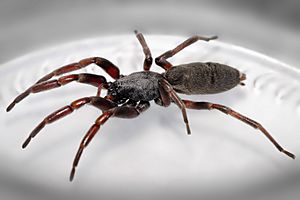Lampona facts for kids
Quick facts for kids Lampona |
|
|---|---|
 |
|
| Lampona or Lamponina species | |
| Scientific classification |
|
| Kingdom: | Animalia |
| Phylum: | Arthropoda |
| Subphylum: | Chelicerata |
| Class: | Arachnida |
| Order: | Araneae |
| Infraorder: | Araneomorphae |
| Family: | Lamponidae |
| Genus: | Lampona Thorell, 1869 |
| Type species | |
| L. cylindrata (L. Koch, 1866)
|
|
| Species | |
|
57, see text |
|
Lampona is a group of spiders found in the South Pacific region, mainly in Australia and New Guinea. These spiders belong to the family Lamponidae. They were first described by a scientist named Tamerlan Thorell in 1869.
Some of the most famous Lampona spiders are known as "white-tailed spiders." This is because they have a small, whitish tip on their abdomen (the back part of their body). These spiders are known for hunting other spiders. They have also made their way to New Zealand. The name Lampona comes from an old English word, laumpe, which means "light" or "fire."
What are Lampona Spiders?
There are currently 57 known types, or species, of Lampona spiders. Most of these species live in Australia, but one is found in New Guinea. Scientists continue to study these spiders to learn more about them.
Famous Lampona Species
Two well-known species are often called white-tailed spiders. These are Lampona cylindrata and Lampona murina. Both are found in Australia and New Zealand.
- L. cylindrata (first described in 1866)
- L. murina (first described in 1873)
Many other Lampona species exist, each with its own unique features and habitats across Australia. For example, some are found only in Queensland, while others live in Western Australia or Tasmania.
Where Lampona Spiders Live
Most Lampona spiders are native to Australia. This means they naturally live there. They can be found in many different parts of the country, from the warm, wet areas of Queensland to the drier central regions and the cooler south. One species, L. papua, lives in New Guinea.
Some species, like the white-tailed spiders, have also spread to New Zealand. This often happens when spiders hitch a ride with people or goods.
See also
 In Spanish: Lampona para niños
In Spanish: Lampona para niños
 | Georgia Louise Harris Brown |
 | Julian Abele |
 | Norma Merrick Sklarek |
 | William Sidney Pittman |

